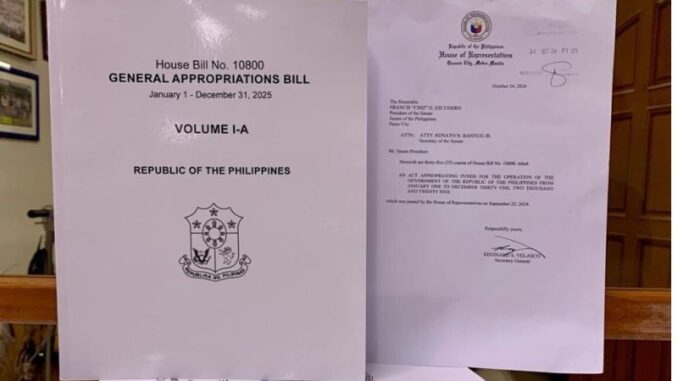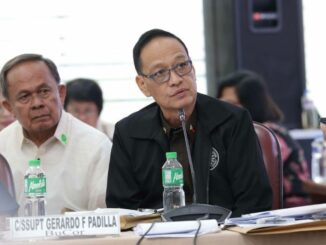
MANILA, Philippines — The House of Representatives sent copies of the proposed 2025 national budget, including the appropriations committee’s approved amendments, to the Senate on Thursday, October 24.
The proposed 2025 national budget, also referred to as the General Appropriations Bill (GAB), amounts to P6.352 trillion, marking a 10.13% increase from the current budget of P5.767 trillion.
House revisions to the 2025 National Expenditure Program (NEP), the executive branch’s proposed spending plan, include a P292.23-billion realignment toward social services, education, health, agriculture and national security.
Additional budgets for the following government programs were proposed:
Department of Social Welfare and Development (DSWD)
- Assistant to Individuals in Crisis Situations (AICS): P39.8 billion
- Ayusa sa Kapos ang Kita Program (AKAP) for individuals earning P21,000 or below per month: P39.8 billion
- Sustainable Livelihood Program for low-income families: P3.4 billion
Department of Labor and Employment (DOLE)
- Tulong Panghanapbuhay sa Ating Disadvantaged/Displaced Workers (TUPAD) and Government Internship Program: P20.28 billion
- Training for Work Scholarship Programs (TWSP): P6.105 billion
Commission on Higher Education (CHED)
- Tertiary Education Subsidy: P15.005 billion
- Tulong Dunong Program: P15.005 billion
- State Universities and Colleges (SUCs): P1.175 billion
Department of Education (DepEd)
- Repair and construction of school facilities: P7 billion
Armed Forces of the Philippines (AFP)
- Increase in daily subsistence allowance to P250 for soldiers: P8.44 billion
- Airport expansion on Pag-asa Island and shelter port in Lawak, Palawan: P3.2 billion
Department of Agriculture (DA)
- Philippine Irrigation Network Piping System, solar-powered irrigation systems, cold storage projects: P30 billion
National Irrigation Administration (NIA)
- Pump irrigation and solar-driven pump irrigation projects: P44 billion
Department of Health (DOH)
- Health Facility Enhancement Program (HFEP) and Medical Assistance for Indigent and Financially Incapacitated Patients Program (MAIFIP): P56.87 billion
- University of the Philippines-Philippine General Hospital: P1 billion
Department of Interior and Local Government (DILG)
- Philippine National Police’s vehicle acquisition: P150 million
- Bureau of Fire Protection’s fire trucks: P75 million
Department of Tourism (DOT): P491.186 million
Department of Transportation (DOTR)
- Philippine Coast Guard: P1.19 billion
Cultural Center of the Philippines (CCP): P1 billion
This data combines the realigned funds outlined in previous statements from Rep. Elizaldy Co (Ako Bicol Partylist), chairperson of the House Appropriations Committee, with the information requested by Philstar.com.
Co’s press releases only covered the proposed P283.8 billion realignment. However, the information Philstar.com obtained regarding the remaining P8.43 billion amounted to around P10.187 billion instead.
Philstar.com has sought clarification on this discrepancy and will update the article upon receiving a response.
Why a realignment, not an overall increase?
A realignment of funds means that an agency’s budget has been reduced to enhance the budget of another, as lawmakers deem it necessary.
Congress is restricted to adjusting budget allocations within the ceiling of the P6.352 trillion recommended by the president in the 2025 NEP.
Section 25, Article VI of the 1987 Constitution prohibits Congress from exceeding the total appropriations proposed by the president.
The Office of the Vice President (OVP) is the sole government agency that Co identified in press releases as facing budget cuts, with P1.3 billion being reallocated to DSWD and DOH from the initially proposed OVP budget of P2.03 billion.
RELATED: House panel moves to slash more than half of OVP budget
Co said on October 16 that the P1.3 billion will be evenly distributed to increase the budget for AICS and MAIFIP programs, giving them P646.5 million each. Budget cuts to the OVP were proposed after House lawmakers saw its social services programs as redundant to the functions of other agencies.
Information is still unavailable regarding which government agencies, besides the OVP, will face budget decreases to accommodate increases for other agencies in the proposed amendments.
Philstar.com has reached out to Co’s staff to request this data and will update the article once received.
The Senate is set to hold plenary debates in November to finalize its version of the proposed 2025 national budget.
Senate President Francis “Chiz” Escudero said that Congress aims to approve the budget by the second week of December at the latest. This will be done in a bicameral conference with the House of Representatives.





Be the first to comment